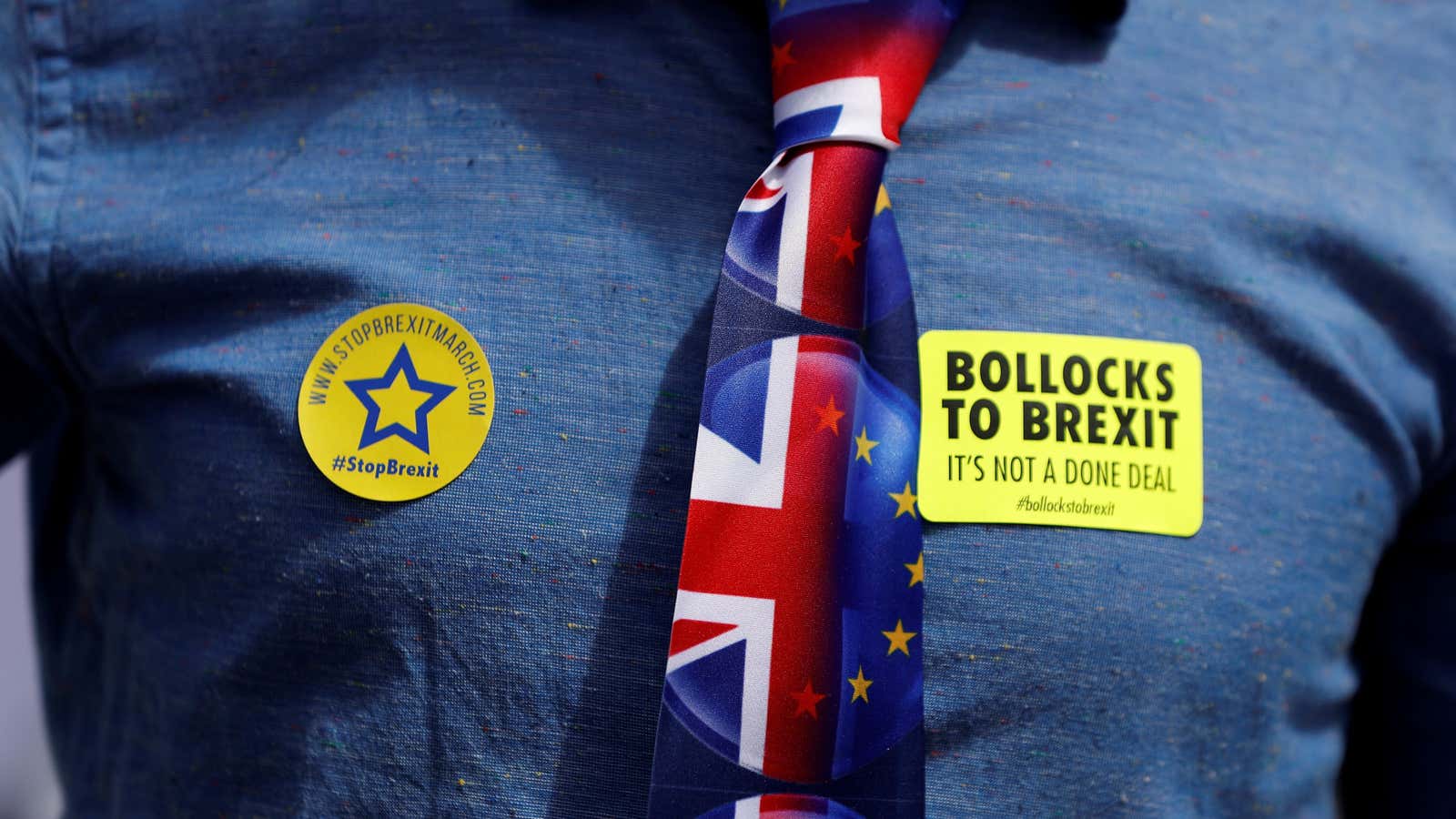A small UK political party is benefitting from anchoring its campaign around a big, brash British word: “bollocks.”
The distinctive word isn’t just colorful or crass. It has a long political history as a bold statement. And the Liberal Democrats, a pro-EU centrist party, is hoping that history, wrapped up in its campaign slogan “Bollocks to Brexit,” could help it win over frustrated voters.
Indeed, the Lib Dems are polling in the number two spot among UK parties in the European Parliament elections, ahead of both the ruling Conservatives and the opposition Labour party. The UK voted on Thursday (May 23), while other EU members will wrap up their elections by tomorrow.
The word choice is certainly getting attention. Last week, BBC presenter Andrew Marr refused to say the slogan on live television, calling it “coarse” and “a profanity that we don’t normally use in political discourse.” It’s a word with a “long and distinguished history,” Lib Dem leader Vince Cable said in its defense.
What does “Bollocks” even mean?
The word bollocks is likely of Germanic origin, according to the Oxford Dictionary, and was first used to refer to “testicles.” Some reports say its usage dates back about a thousand years, and it has appeared in English-language medieval bibles.
Its use as a slang term first emerged in the 18th century, when it was used to refer to nonsense-spouting clergymen. That usage persists today, with “bollocks” defined as “nonsense; rubbish,” and “used to express contempt or disagreement, or as an exclamation of annoyance.” Which is exactly what the Lib Dems think of Brexit.
“It is also in a slightly coarser context a synonym for parts of the male anatomy,” explained Sam Barratt, the director of communications for the Lib Dems. “Which is not the context which we are using it in of course.”
The punk rock connection
The word became forever tied to the punk rock movement when the Sex Pistols named their first and only studio album in 1977 Never Mind the Bollocks, Here’s the Sex Pistols.
The album title generated much controversy at the time, and the band was prohibited from playing gigs at many venues across England. Record stores refused to stock the album; others were penalized for doing so. The manager of one Virgin shop, Chris Seale, found himself arrested and in court for displaying posters about the album in his Nottingham store window.
Founder Richard Branson called up a linguist at Nottingham University, who used historical research to argue that “bollocks” was an innocuous word, citing its colloquial use as a nickname for a clergyman, and thus didn’t run afoul of the 1899 Indecent Advertisement Act. The professor, who happened to also be a priest, reportedly donned his clerical collar in court and said the album could be translated as Never Mind the Priests, Here’s the Sex Pistols.
The defendants were later acquitted, rather reluctantly. “Much as my colleagues and I wholeheartedly deplore the vulgar exploitation of the worst instincts of human nature for the purchases of commercial profits by both you and your company, we must reluctantly find you not guilty of each of the four charges,” the chairman of the committee proceedings reportedly said at the time.
What about the Lib Dems?
Slogans that are forceful and punchy tend to do well in elections, and this one has all those ingredients. In his BBC interview, party leader Cable told Marr the group was “not the least bit embarrassed” by the word. “It means that we’re absolutely clear about stopping Brexit. That’s what we are. Unambiguous and honest and I think that conveys it as well as anything else,” he said.
The phrase was co-opted by the Lib Dems from a pre-existing movement, begun after the 2016 referendum, by a group called the “EU flag MAFIA.” They put the expression on bright yellow stickers—of which they’ve sold around 700,000—adding “It’s Not a Done Deal.” They are regularly sported at anti-Brexit marches around the UK.
“There is literally NO SENSE to Brexit and in this context it is quite clear and apparent that our use of the word ‘bollocks’ is entirely appropriate and fixates itself to mean ‘nonsense,’” the group has argued. “The word cannot be offensive as it is not being used in an offensive context.”
The phrase is “a homage” to the movement, Barratt says. “It started in the grassroots, and we are happy to stand with them.”
Is the slogan working?
While bold posters and smart slogans help, smaller parties have found an electoral opening since the UK narrowly voted to depart the EU in 2016. The minority Conservative government, propped up by the Northern Irish DUP, has been unable to find agreement on a way forward to deliver Brexit, ultimately leading to prime minister Theresa May’s resignation on Friday (May 24). The opposition Labour party, meanwhile, has been criticized for its mixed Brexit messaging.
Local UK elections earlier this month saw the Conservatives pummeled, losing 1,330 council seats. The Lib Dems picked up 705, their best showing in party history.
The Lib Dems have overtaken both the Conservative and Labour parties in European election polling, but are behind the newly-created, anti-EU Brexit party. That the two top parties have clear-cut positions on Brexit might be one reason behind their success. “The contrast with the less distinct and at times rather confused-sounding interventions of [other parties] is stark. In addition, the slogan has the virtue of sincerity,” writes Stefan Stern for the Guardian.
Or, as Barratt puts it: “If you try and sit… in the middle of the road, you get run over.”
